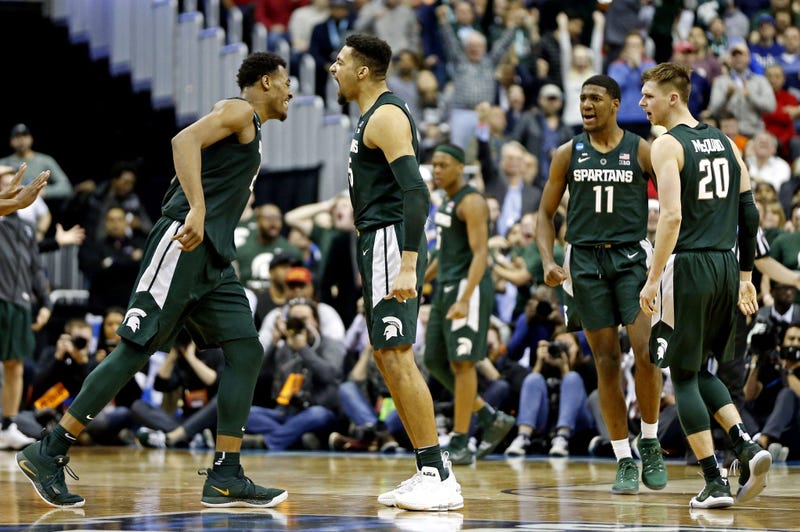
Henry wasn’t having it. He followed Winston off the podium and down the hallway toward Michigan State’s locker room, pleading his case. At least put him before Xavier Tillman, Henry begged. Winston and Tillman, leading the way, looked at each other, then back at Henry, and laughed at the mere suggestion. Henry grinned and continued a debate he knew he had no chance to win.
But who could’ve guessed what was going to happen Sunday night. Kenny Goins wasn’t exactly on fire entering the biggest game of the year. After turning himself into a shot-maker this season, he could hardly hit a darn one in the NCAA Tournament. He was 6-25, and 4-19 from three, through the first three rounds.
It was Goins who started the conversation with Winston in the first place. As Winston’s interview was winding down, Goins slipped into a chair in the back row, Henry and Matt McQuaid his partners in crime, and lobbed the last question: “Who would you pass to for a game-winning shot: me or Quaido?”
Winston didn’t miss a beat.
“Big Shot!” he said. “Boy, you crazy. You know I’m throwing it to Big Shot.”
Big Shot would be McQuaid, the senior with the silky stroke. But on Sunday night it would be Goins, who got an open look beyond the three-point line with about 30 seconds to play, Michigan State trailing Duke by one, and knocked it down without flinching to send the Spartans to the Final Four. He said he knew it was good the second it left his hands.
“He might be Big Shot now,” said Winston.
"Quaido called me it," said Goins, "so maybe I’ll embrace it a little bit."
“We’re sharing the name as seniors,” said McQuaid.
The mark of a shot-maker isn’t necessarily the ability to, well, make shots. It’s to keep taking them when they’re not going down. Despite his struggles from beyond the arc in the Tournament, Goins hasn’t stopped letting it fly. He led Michigan State in three-point attempts over the first three games. He knows the team needs him to score. Just to be sure, Tom Izzo playfully reminded him all weekend.
“I kept telling him the last couple of days,” Izzo smiled, “‘Are you gonna make a shot? Would you like to make a shot? Do you think you can make a shot?’”
The answer was no in the first half Sunday night, with Goins missing all four of his threes, including a couple great looks. In the locker room at halftime, Izzo told Goins it looked like he was rushing it. Goins coolly replied, “I’ll make the next one, Coach.” Izzo believed him, and Goins was right. He drilled a three from the top of the arc to tie the game at 56 inside nine minutes to play. Don’t let a shot-maker get hot.
Really, Duke never did. Goins had his next three blocked by a leaping Zion Williamson, then missed one after that. He was 3-11 from the field and 1-7 from three as Michigan State called timeout and huddled up for its biggest play of the season. So if there was anything more surprising than Goins nailing the shot that ensued, it’s that it was his shot to take.
For what it’s worth, Winston ranked Goins second, behind McQuaid, on his list of trusted shooters. In the huddle, the coaches asked Winston what he wanted to run, as they often do in key moments. He was tempted to call his own name, and in this kind of situation he almost always does. But he knew Duke would be expecting that, and he figured there were better defenders to attack than Tre Jones, who had guarded him well all game. So Winston suggested a play where he’d be a screener and the third option to score.
The design was for Winston to set a screen at the elbow for Goins, who would be option number one from beyond the arc, then set a backscreen for Tillman, who would be option number two rolling to the rim. If neither look was open, Winston would pop out and make a play himself. The play was really drawn up for Tillman, with Goins serving as a decoy. Winston’s first screen was on Williamson, of all people, a man 100 pounds his larger. He laughed at this mismatch afterward, but added, “I held my ground a little bit. He got by me pretty quick, but I gave him just enough.”
Indeed, Goins was wide open when he took the pass from Tillman, though Williamson was closing fast, eyeing another block. There was no time for Goins to think – about his struggles in the Tournament, about his struggles in this game, about whether or not to shoot. So he never did.
“Not one bit,” Goins said. “As soon as it touched my hands I knew I was shooting it. As soon as I let it go I knew it was good.”
It was a high-arching rainbow, and it landed with a splash.
“All net,” said McQuaid. “I saw Zion jump up and I was like, ‘Nah, that’s in.’”
“Shot was pretty,” said Winston.
“He buried that thing,” said Izzo.
On this night he was the scorer, just like he told Winston he could be.
"We were talking about it yesterday, about the shot at the end of the game," Goins said with a smile. "I told him to trust me. I had the confidence in myself, and apparently he listened.”
